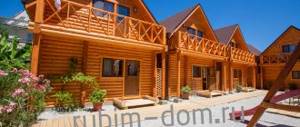What is it - individual housing construction, SNT, DNT?
In addition to area and location, each plot of land has two main characteristics:
- Land category
- Type of permitted use
Cottage villages in Novosibirsk are most often located on land plots of two categories: land of settlements and land for agricultural purposes.
On the lands of settlements, plots usually have a type of permitted use - for individual housing construction, or less often for summer cottage construction.
On agricultural lands, the type of permitted use of plots is most often for summer cottage construction or for gardening.
Accordingly we get:
Individual housing construction is a type of permitted use, stands for Individual Housing Construction. Plots for individual housing construction are located only on the lands of populated areas.
DNT and SNT are non-profit organizations created to manage the village (collection of fees, maintenance of communications, village infrastructure, etc.)
DNT - means Dacha Non-Profit Partnership. More often it is located on agricultural lands, but sometimes also on the lands of settlements that have permitted use - “for summer cottage construction”.
SNT is a Garden Non-Profit Partnership. Placed exclusively on agricultural lands with permitted use - “for gardening”.
24.11.2015
Light / Electricity in SNT
The non-transparent calculation of the amount of “losses in networks” and the threat of a power outage from the chairman of SNT are some of the most pressing “electrical issues” for SNT members. In this regard, many gardeners will be interested in an interview with Sergei Galkin, head of the branch of United Energy Company OJSC (manages power grids in several Russian regions), which was published by the Ural publication Rush Hour (Verkhnyaya Pyshma, Sverdlovsk region).
What are losses in SNT networks and how can they be reduced?
– Sergey Aleksandrovich, gardeners everywhere complain about extortions from chairmen in the form of inflated tariffs per kilowatt, supposedly to cover losses in networks. Where do these losses come from and how much are they really worth?
– The whole problem is that SNT is obliged (under the energy supply contract) to pay not only for the consumed electrical energy, but also for the technological losses of electricity that occur in SNT networks and are not taken into account by the calculated meter. The amount of technological losses is indicated in the energy supply contract and, as a rule, consists of two parts: constant and variable. In addition, in low-voltage SNT networks, losses also occur when transmitting electricity from the transformer to the consumer.
As a result, its consumption according to the calculated meter will always be greater than according to the sum of the readings of the metering devices of all members of the SNT. For these reasons, SNT has a “cash gap”, that is, less money is collected than SNT must pay under the energy supply agreement. It is this gap that the chairman is trying to close in various ways.
The chairman often does not know the laws and proposes to increase the tariff in order to cover the cash gap and pay for technological losses, for example, up to 3 rubles per kilowatt. This path is illegal - no one has the right to change the tariff. It is installed by REC one for everyone. And if such a fact exists in any SNT, then this is a matter for the prosecutor’s office and the REC.
What should the chairman do to cover losses? It is necessary to introduce targeted contributions to pay for losses. Then there will be no complaints. As a rule, the amount of losses is known - it is approximately the same from month to month. In this case, it is possible to calculate the amount of losses for a month and a year in advance and announce it at the general meeting. I repeat, this is a targeted fee to pay for losses.
– What is hidden behind the losses in the network, is it possible to somehow manage without them?
– In 100% of cases, the causes of losses are hidden in the networks, and you need to look inside your electrical equipment: these are worn wires, twists, bad contacts, the transformer may be configured incorrectly, or a large number of consumers sitting on the same phase. There are many reasons. Losses depend on the quality of electrical equipment in SNT. They're actually not that scary. Losses are constant and do not depend on the consumer; they are expressed as a fixed figure. Variable losses are load losses - they depend on the amount of electricity consumption. And they are expressed as a percentage - 2-3%, but not more than 5% - of total consumption.
Gardeners need to look at the amount of losses included in the electricity supply contract. We have seen old contracts where losses of 14% were included. Gardeners need to go to power engineers, ask why there is such a large percentage of losses, and renegotiate the contract, and new contracts include losses of up to 5%. Although within networks in SNT, losses can reach a higher percentage - everything depends, I repeat, on the quality of the electrical property.
Does the chairman of the SNT have the right to turn off the gardener’s electricity?
– Gardeners complain about the chairman cutting off electricity from their garden plot, often as punishment for “disobedience.” Moreover, for connecting to electricity, the chairman demands a certain amount, reaching up to 50 thousand rubles.
– There is a Decree of the Government of the Russian Federation dated December 27, 2004 N 861 “On approval of the Rules for non-discriminatory access to services for the transmission of electrical energy and the provision of these services.” Based on this Resolution, no one (even the chairman of SNT) has the right to disconnect the consumer from electricity.
What's really going on? There are always two points of view - either this is a bad chairman or a bad gardener. The chairman takes such a measure as turning off the electricity for several reasons:
- The consumer (gardener) refuses to pay for electricity - he is a defaulter.
- A member of the SNT does not allow the chairman, electrician or other people to take readings to his metering device. There are cases when the owner rushes with an ax or shovel at the inspectors and motivates by the fact that his plot is privatized and it is his property.
- The consumer, a member of SNT, has low meter readings and the chairman has suspicions of electricity theft.
And the chairman is obliged to ensure the replenishment of the cash register and he has nowhere to get money from to settle payments with the electric grid organization. Therefore, it initiates a power outage to the consumer.
But! The chairman is doing the wrong thing - his actions are illegal, he has no right to disconnect. Only the energy supply company can issue a disconnection order. Demanding money for connecting to electricity after a previous unauthorized shutdown is also illegal. And this is what the prosecutor's office does.
Sources: Media holding Chas Rik
Differences between individual housing construction and DNT/SNT:
- Distance from populated areas
DNT lands are usually located at a greater distance from populated areas than lands for individual housing construction. This is due to the fact that the new section of land for individual housing construction must be adjacent or in some way connected to an existing settlement. Accordingly, if you want to enjoy untouched nature, then you better take a closer look at land plots in DNT, and if you need proximity to municipal infrastructure such as a kindergarten, school, shops or general. transport, then choose from plots for individual housing construction. - Use of maternity capital
Maternity capital can be used when building a house only on land for individual housing construction. Also in the Novosibirsk region, on lands for individual housing construction, it is possible to take advantage of the Construction Subsidy if its issuance is resumed. - Construction permit
Before starting construction of a residential building on land for individual housing construction, it is necessary to obtain a construction permit in accordance with Article 51 of the Town Planning Code of the Russian Federation. On agricultural lands there is no need to obtain a building permit. - Urban planning norms
On lands with the status of individual housing construction, there are town planning standards that clearly define: - the width of streets, the presence of sidewalks, the location of recreation areas and infrastructure facilities; — min/max dimensions of an individual plot; — compliance of the constructed house with residential standards; — compliance with the norms and rules of the Town Planning Code of the Russian Federation.Modern DNT/SNT also try to comply with urban planning standards, but this process is not regulated and remains at the discretion of the board.
- Registration
After registering a private house/cottage built on individual housing construction land, you can obtain permanent registration, because the house is located on a certain street under a certain number. Since 2011 Permanent registration (registration) is also allowed in houses built on DNT/SNT lands for agricultural purposes; The complexity and duration of registration of registration depends on the existing practice in a given municipality.
Is it possible to register a house in DNT as residential in 2020
- The structure must have a foundation that complies with the standards applicable to residential buildings.
- Thermal insulation of walls must be sufficient for year-round use and comply with sanitary standards.
- Technical compliance of house structures.
- Register by filling out the required declaration.
- But with the introduction of a new rule on obtaining a technical passport, registering such objects has become more difficult. Previously, it was possible to indicate the approximate area in the declaration.
Is it possible to live in SNT all year round?
Didn't management take their meter readings during the winter months? They were filming, for sure. This means they will be required to pay. As for line losses, yes, it is difficult. Our chairman tried to explain why we need to pay extra for electricity. Well, people don’t understand electricity, they think that electricians screwed it up. And those who understand remain silent; people don’t want to spend “extra” money. Such issues are resolved through membership fees so that there is no misappropriation of funds, but this is a matter for the accountant.
. Roads must be cleaned all year round. Even firefighters will not be able to get through if the roads are not cleared during the snowy winter. And besides firefighters, there is also an ambulance. It can become bad not only for those who live in winter, but for those who come to the dacha for just an hour, for example, throwing snow into a greenhouse. People should not be deprived of the opportunity to receive timely medical care.
Differences in building construction
Warning
Almost all garden developments are regulated by SNiP 30-02-97. The same regulatory document highlights the difference between a garden and a residential building.
A garden house is:
- a property used for recreation on a garden plot;
- accommodation in it is possible only temporarily (during the warm season);
- it cannot be divided into separate living quarters;
- You can build without additional permits.
If there is already a garden house on the site, the owner can apply to have it recognized as residential. This is possible if:
- it was built in compliance with all fire safety standards;
- the object has reliable floors, foundations, protection from water;
- all sanitary requirements are met (there is insolation, thermal insulation of walls, etc.);
- lighting, heating, sewerage are provided.
Also, when constructing such an object, the owner must take into account the rules for the location of buildings on the site:
- 3 m from a residential property;
- 4 m from premises where animals are kept;
- 1 m from auxiliary buildings.
Warning
Residential buildings include real estate in which you can live all year round.
About those living year-round
The situation is as follows. One madam has joined our SNT team. Lives all year round. I was unable to obtain individual housing construction. I only paid for electricity and then at a premium. Membership fees and target fees are completely ignored. After much debate, management. composition, the young lady was cut off from the electricity supply for failure to pay her fairly accumulated debts. She submits a statement to the prosecutor's office. The prosecutor takes the applicant's side, allegedly she lives there, so she cannot be deprived of it. But this is not a residential building, but a summer house. I did not participate in the purchase of a transformer, installation of a line, roads, etc. The meeting of gardeners decided not to give the right to use their property, in which case why are we obligated to return this property to her? At the moment, the infrastructure contract with her has been terminated. It was agreed with the prosecutor that he would issue a fine to the chairman and write to her so that she would go to court. I applied, they hired some really “cool” lawyer, the lawyer said that the case was trivial and lost, they filed an appeal. We have two more such “clients” living with us, if we somehow managed to come to an agreement with one, then with the second it’s about the same story - “I won’t pay for anything, go through the forest, you won’t do anything to me.”
All of them submitted applications to Rosseti to conclude contracts with them. Rosseti are rejecting them as much as they have the strength (our SNT is very far from their lines). They pretend that everything is in progress, but in reality they are waiting for refusals from gardeners to allow lines to run through their plots to the applicants’ houses. And then the contracts will be terminated, i.e. Rosseti will send them this without any options. While they believe in a bright future, they have become quiet. But accordingly, when they receive Rosseti’s decision, they will start fucking with us again. A meeting of gardeners decided to turn off electricity for the winter. The exception would be one house, an infrastructure contract was concluded with it, it runs its own line from the TP and its meter to the TP. PySy: All last winter, these “tenants” dragged the chairman to all sorts of authorities, except that they had not yet called the president (the sales company turned off SNT for non-payment of debt). One gets a very depressing impression that everyone except SNT has rights.





